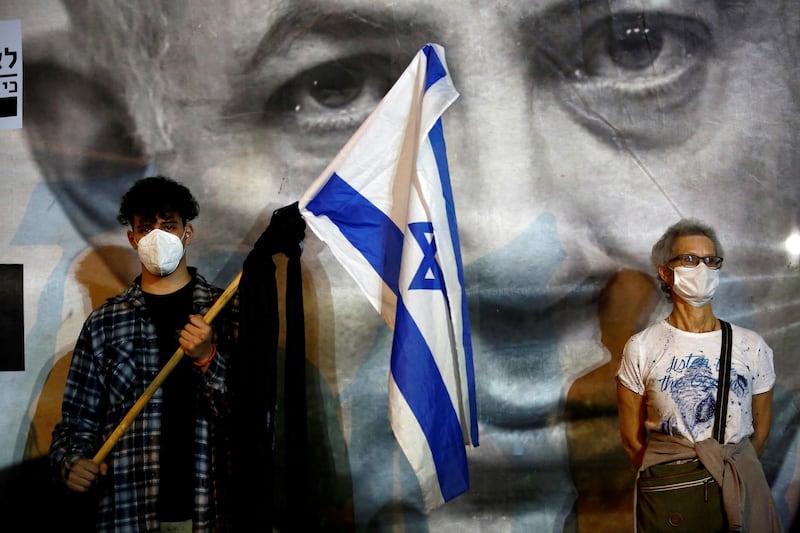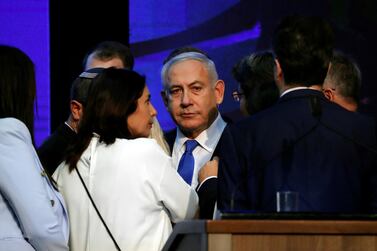A new page in Israeli history opens Sunday as Prime Minister Benjamin Netanyahu becomes the first sitting premier to face criminal charges, accused of a string of corruption allegations he denies.
After more than 500 days of electoral deadlock in which he fought for his political survival Netanyahu is to take his seat in the Jerusalem District Court for a new battle - to stay out of prison and avoid a stain on his legacy.
The 70-year-old is used to setting precedents: he is the first Israeli prime minister born after the foundation of the state in 1948 and the longest-serving in its history.
But the impending trial is a deeply-unwanted first.
He will appear in court Sunday at the start of a corruption trial that is likely to take months or even years.
Here is a look at the accusations against the veteran premier, who denies all charges:
Attorney General Avichai Mandelblit in January indicted Mr Netanyahu for fraud and breach of trust in what are known as cases 1000 and 2000 and for bribery, fraud and breach of trust in case 4000.
Case 1000 involves allegations Mr Netanyahu and his family received gifts including luxury cigars, champagne and jewellery from wealthy individuals, estimated to be worth more than 700,000 shekels ($200,000, 185,000 euros), in exchange for financial or personal favours.
According to police, Hollywood producer Arnon Milchan was responsible for some 478,000 shekels-worth of gifts, while the remainder came from Australian billionaire James Packer.
Mr Netanyahu is suspected in return to have sought to help Milchan receive tax benefits that some reports said could have been worth millions of dollars and assisted him with obtaining a US visa.
Mr Netanyahu argues there is no problem with receiving gifts from friends and denies having acted inappropriately in exchange.
A second investigation, known as Case 2000, concerns allegations Netanyahu sought a deal with the owner of the Yediot Aharonot newspaper that would have seen it give him more favourable coverage.
In exchange, Mr Netanyahu allegedly raised the possibility of pushing for legislation to limit the circulation of Israel Hayom, a free newspaper that is the main rival to Yediot.
Police based their investigation on recordings of meetings between Mr Netanyahu and Yediot's publisher Arnon Moses.
Ari Harow, a former Netanyahu chief of staff, agreed to testify in exchange for leniency.
Mr Netanyahu says he acted against the legislation concerning Israel Hayom.
The third investigation, known as Case 4000, is considered the most serious and also relates to alleged attempts to seek positive media coverage through favours.
Mr Netanyahu is alleged to have negotiated with Shaul Elovitch, the controlling shareholder of Israeli telecommunications giant Bezeq, to get positive coverage on his Walla! news site in exchange for policies benefiting Bezeq.
Shlomo Filber, a Netanyahu ally for more than 20 years and a former communications ministry director general, has become a state witness.
He is accused of mediating between Mr Netanyahu and Mr Elovitch and promoting regulatory changes worth millions of dollars to Bezeq.
Mr Netanyahu dismisses the allegations, saying he received nothing from Mr Elovitch and that Walla's coverage of him has been negative.
He says experts were in support of arrangements for Bezeq.
Mr Mandelblit described a long list of Walla coverage decisions allegedly taken on behalf of Mr Netanyahu.
They included downplaying stories Mr Netanyahu viewed as harmful to him or his family and publishing negative coverage of opponents.
In one case, Mr Netanyahu allegedly pushed for a story about the wife of a political rival having worked in a non-kosher restaurant.
Another allegedly saw the Netanyahus order the publication of a story about his wife Sara attending a Mariah Carey concert and her meeting with the singer.
In alleged communications regarding such coverage, Mr Netanyahu was referred to as "the big one".







